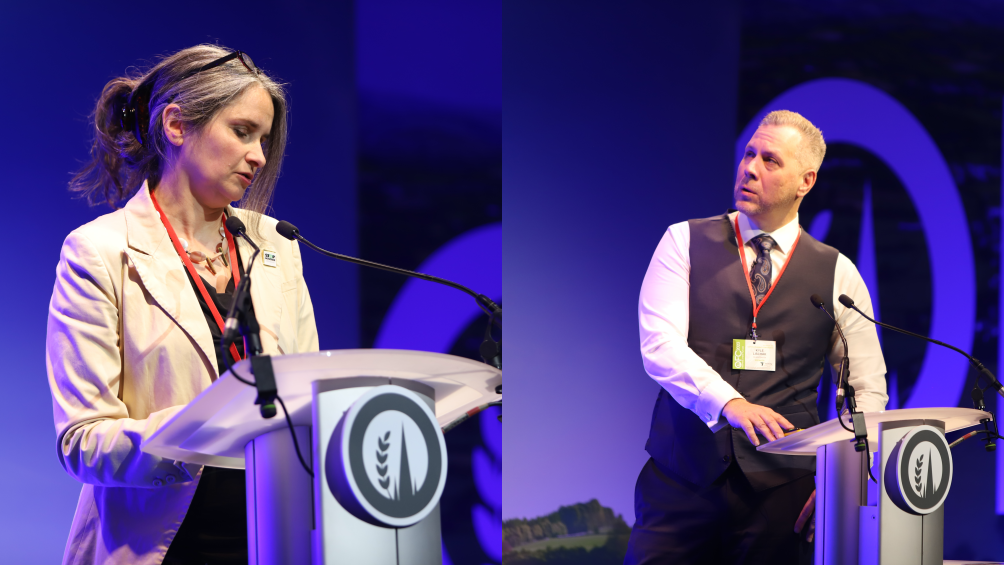Blog: Getting the rules right
5th January 2023 by OFC Press Team

Looking at this from a glass half full perspective, this session “getting the rules right" focused on how do we balance the needs of nature and food production to reverse the decline of nature, whilst ensuring a plentiful safe food supply.
"Nature is the most precious asset for our existence, and for that we do need to have clear rules” Liz Bowles, OFC Director and session chair
In the below section, we summarise the key points from the presentation during which JoJo Mehta highlighted "The definition and implementation of ecocide into international criminal law will provide an international framework as a safety rail for nature, which is in all our interests.”, whilst Kyle Lischak noted we need “a clear, fair and proportionate regulatory baseline, that deters pollution and establishes a level playing field – at the post Brexit UK level."
This session was recording and will be available to watch back on-demand post-conference.
Speaker one: JoJo Mehta
Work to develop global cross sector protection for nature.
To be the Outer boundary guardrail to protect the worlds ecoysystems from harm.
What this legal initiative can provide is a safeguard for our children, a framework for protection of nature. Within Criminal law, criminal law is a framework of protection, to draw lines for society to protect things and prevent them happening, not to punish the transgressors.
‘It’s a form of self-preservation for humanity’ JoJo said. The legal system does not fully recognise the concept yet, hence finance still flows towards projects which damage nature.
However many companies now offer “A seat on the board for nature.” Which can give company directors the power to respond to shareholders about what the company can or cannot do.
‘Ecocide’ means unlawful or wanton acts committed with knowledge that there is a substantial likelihood of severe and either widespread or long-term damage to the environment being caused by those acts. – Independent Expert for the Legal Definition of Ecocide June 2021
Examples include:
Belgium – govt intends to legislate re ecocide. UN now considering ecocide and its being considered by the international criminal court as being added to the list of crimes considered.
The concept of ecocide as a crime provides a lens for sectors to analyse their work and approaches to identify their constraints and rules of engagement. The holes still exist in the absence of a specific international law which defines ecocide. However there is a growing appetite for the gravest harms in nature to be recognised in law. From a practical perspective this is necessary for all our futures.
Speaker two: Kyle Lischak
During his presentation, Kyle gave a very swift sprint around the UK governments approach and progress thus far with environment and climate targets.
Climate change 2008
- ‘Net Zero’ target, the net UK carbon account for the year 2050 is at least 100% lower than the 1990 baseline.
- Targeted greenhouse gases include carbon dioxide, nitrous oxide , methane and others
- R. (on the application of Friends of the Earth Ltd) v Secretary of State for Business, Energy and Industrial Strategy (July 2022). Government must update climate strategy by the end of March 2023 to provide a more detailed account of how its policies will actually achieve climate targets
Environment Act 2021
- Requires the setting of an environmental improvement plan and long term (and interim) environmental targets.
- Targets include water (N, P and sediment loads 40% lower than 2018 baseline by 2038)
- OEP: Governments failure to meet 31st October target deadline ‘was a serious failure to comply with environmental law’ targets have now been laid before Parliament.
The 25 Year Environment plan
- First Environment plan under the Environment Act 2021
- The first review of the first environmental improvement plan must be completed by 31st January 2023
- Improving how we manage and incentivise land management post-EU Common Agricultural Policy (CAP)
- Public money for public goods
- Improved regulatory baseline for water and air pollution from agricultural sources – included in relation to efficient fertiliser use
- A robust control framework for pesticides with a focus on Integrated Pest Management
Implementation and Progress (?)
1 - Incentives
Delay and uncertainty around ELMS and implementation
Removal of cross compliance (including soil, watercourse and hedgerow protections)
Lack of new financial incentives against the removal of Basic Payment Schemes
Lack of detail including how schemes will meaningfully contribute to environmental and climate targets over time and how measured.
2 - Regulatory standards
Poor implementation and enforcement eg the Farming Rules for Water and SSAFO to ensure basic good practice, deter pollution and create a level playing field.
Move away from the 25 Year Environment Plan (YEP) commitments to improve baseline to voluntary measures e.g. ammonia emissions.
Retained EU Law (Revocation and Reford) Bill including December 2023 ‘sunset’ clause
Sunset clause – any EU law which is not dealt with by dec 2023, ie integrated formally into UK law, it just drops off the statute book – a challenge on the horizon.
In summary – here is what we need:
- Long term security of domestic food production
- Reduced reliance on imported fertilisers
- Reduced input costs
- Carbon sequestration and climate resilience
- Improved water quality and conservation
- Improved biodiversity and ‘rewilding’
By means of a clear, fair and proportionate regulatory baseline that deters pollution and establishes a level playing field.
